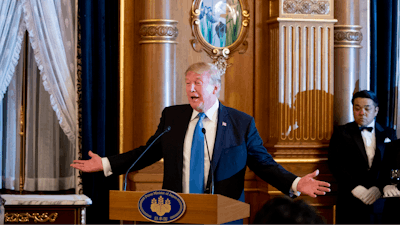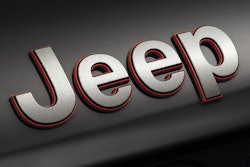
WASHINGTON (AP) — President Donald Trump, traveling Asia, is claiming a "phenomenal" economic performance at home, "if I do say so myself."
He does, indeed, say so himself, over and over. But what do those numbers say?
In short, they point to an unquestionably solid record during Trump's first year in office, though one that builds on steady economic progress under his predecessor. Meanwhile, he also made comments on the U.S.-Japan auto trade that seem less grounded in reality.
A look at his recent claims on both subjects in remarks Monday to business leaders in Tokyo:
TRUMP: "Numbers are phenomenal over the last — since November 8th, Election Day. Our unemployment is at a 17-year low. We've gotten almost 2 million more people in the workforce in just that short period of time. I've reduced regulations terrifically, frankly, if I do say so myself." — remarks to business leaders in Tokyo, Monday.
TRUMP tweet Saturday: "Unemployment is down to 4.1%, lowest in 17 years. 1.5 million new jobs created since I took office. Highest stock Market ever, up $5.4 trill."
THE FACTS: His numbers are close to the mark. Trump can rightfully brag about the U.S. economy, but it's not quite as exceptional as he says, and he can't yet legitimately claim that his record on job creation is vastly superior to Barack Obama's. Many of the economic figures he cites are advancing a recovery from the Great Recession that dates back to the middle of 2009.
The unemployment rate did slip to 4.1 percent in October. But that was in part because many Americans gave up searching for work — one of the criticisms Trump made of Obama's record during the 2016 campaign.
Trump also takes credit for helping create on average 168,500 jobs a month, but Obama in 2016 averaged about 187,000 jobs a month. Of course, hiring should slow as the unemployment rate declines because fewer people are searching for work.
As for the stock market, the Dow Jones Industrial Average returned to its previous peak in March 2013 and has been setting records ever since. The promise of corporate tax cuts by Trump has helped the stock market, but many of the gains rest on the foundations of an economic recovery in which corporate profits climbed.
___
TRUMP:
— "Right now, our trade with Japan is not fair and it's not open, but I know it will be, soon. We want free and reciprocal trade, but right now our trade with Japan is not free and it's not reciprocal."
—"Many millions of cars are sold by Japan into the United States, whereas virtually no cars go from the United States into Japan."
THE FACTS: When Trump calls for reciprocity in Japan-U.S. trade, he might want to be careful what he wishes for.
With autos, for example, Japan places no tariff on fully assembled vehicles that are imported. But the U.S. has a 2.5 percent tariff on most imported vehicles — 25 percent on pickup trucks. That imbalance — or lack of reciprocity — favors the U.S.
It's true U.S. vehicle sales in Japan pale in comparison with Japanese sales in the U.S. Detroit has long complained about regulations that stop U.S. carmakers from opening dealerships or selling cars in Japan. But there are other reasons for the disparity in the auto trade, as well. For example, Japan uses right-hand-drive vehicles; the U.S. mainly makes left-hand-drive vehicles in its domestic industry.
And Trump's point about Japanese vehicles pouring into the U.S. is somewhat off the mark. Made-in-Japan vehicles are a distinct minority of the vehicles sold in the U.S. by Japanese automakers.
More than half the vehicles sold in the U.S. by Japanese manufacturers are built in the U.S., says the Japan Automobile Manufacturers Association. Three-quarters of them are built in North America.
Japanese automakers have 24 U.S. factories, which built nearly 4 million vehicles in 2016.
Trump needled Japanese executives at the meeting: "Try building your cars in the United States instead of shipping them over. Is that possible to ask?"
But he's well aware of Japanese auto investment in the U.S. In the next breath, he rattled off a series of such investments by Toyota, Mazda and others.
___
Krisher reported from Detroit. Associated Press writer Cal Woodward contributed to this report.






















